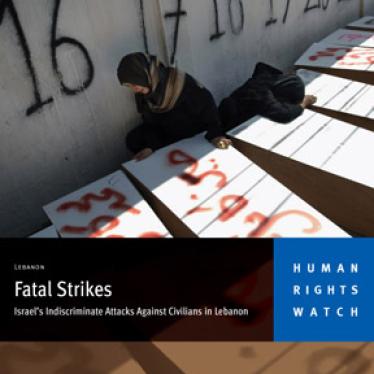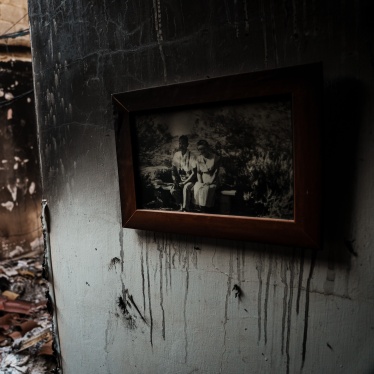Israeli forces have systematically failed to distinguish between combatants and civilians in their military campaign against Hezbollah in Lebanon, Human Rights Watch said in a report released today. The pattern of attacks in more than 20 cases investigated by Human Rights Watch researchers in Lebanon indicates that the failures cannot be dismissed as mere accidents and cannot be blamed on wrongful Hezbollah practices. In some cases, these attacks constitute war crimes.
The 50-page report, “Fatal Strikes: Israel’s Indiscriminate Attacks Against Civilians in Lebanon,” analyzes almost two dozen cases of Israeli air and artillery attacks on civilian homes and vehicles. Of the 153 dead civilians named in the report, 63 are children. More than 500 people have been killed in Lebanon by Israeli fire since fighting began on July 12, most of them civilians.
“The pattern of attacks shows the Israeli military’s disturbing disregard for the lives of Lebanese civilians,” said Kenneth Roth, executive director of Human Rights Watch. “Our research shows that Israel’s claim that Hezbollah fighters are hiding among civilians does not explain, let alone justify, Israel’s indiscriminate warfare.”
The report is based on extensive interviews with victims and witnesses of attacks, visits to some blast sites, and information obtained from hospitals, humanitarian groups, security forces and government agencies. Human Rights Watch also conducted research in Israel, assessing the weapons used by the Israel Defense Forces (IDF).
Human Rights Watch researchers found numerous cases in which the IDF launched artillery and air attacks with limited or dubious military objectives but excessive civilian cost. In many cases, Israeli forces struck an area with no apparent military target. In some instances, Israeli forces appear to have deliberately targeted civilians.
In one case, an Israeli air strike on July 13 destroyed the home of a cleric known to have sympathy for Hezbollah but who was not known to have taken any active part in the hostilities. Even if the IDF considered him a legitimate target (and Human Rights Watch has no evidence that he was), the strike killed him, his wife, their 10 children and the family’s Sri Lankan maid.
On July 16, an Israeli aircraft fired on a civilian home in the village of Aitaroun, killing 11 members of the al-Akhrass family, among them seven Canadian-Lebanese dual nationals who were vacationing in the village when the war began. Human Rights Watch independently interviewed three villagers who vigorously denied that the family had any connection to Hezbollah. Among the victims were children aged one, three, five and seven.
The Israeli government has blamed Hezbollah for the high civilian casualty toll in Lebanon, insisting that Hezbollah fighters have hidden themselves and their weapons among the civilian population. However, in none of the cases of civilian deaths documented in the report is there evidence to suggest that Hezbollah was operating in or around the area during or prior to the attack.
“Hezbollah fighters must not hide behind civilians – that’s an absolute – but the image that Israel has promoted of such shielding as the cause of so high a civilian death toll is wrong,” Roth said. “In the many cases of civilian deaths examined by Human Rights Watch, the location of Hezbollah troops and arms had nothing to do with the deaths because there was no Hezbollah around.”
Statements from Israeli government officials and military leaders suggest that, at the very least, the IDF has blurred the distinction between civilians and combatants, arguing that only people associated with Hezbollah remain in southern Lebanon, so all are legitimate targets of attack. Under international law, however, only civilians directly participating in hostilities lose their immunity from attack. Many civilians have been unable to flee because they are sick, wounded, do not have the means to leave or are providing essential civil services.
Many civilians are afraid to leave the south because the roads are under Israeli attack. Hundreds of thousands of Lebanese have fled their homes, but Israeli forces have fired with warplanes and artillery on dozens of civilian vehicles, many flying white flags. Israel has justified its attacks on roads by citing the need to target Hezbollah fighters moving arms and block their transport routes.
However, none of the evidence gathered by Human Rights Watch or reported to date by independent media sources indicate that any of the attacks on vehicles documented in the report resulted in Hezbollah casualties or the destruction of weapons. Rather, the attacks have killed and wounded civilians who were fleeing their homes after the IDF issued instructions to evacuate.
“Israeli warnings of imminent attacks do not turn civilians into military targets,” said Roth. “Otherwise, Palestinian militant groups might ‘warn’ Israeli settlers to leave their settlements and then feel justified in attacking those who remained.”
Human Rights Watch urges Israel to immediately end indiscriminate attacks and distinguish at all times between civilians and combatants. Human Rights Watch also calls on the United States to immediately suspend transfers of arms, ammunition, and other materiel credibly alleged to have been used in violation of international humanitarian law in Lebanon, until these violations cease. Human Rights Watch further asks the Secretary-General of the United Nations to establish an International Commission of Inquiry to investigate reports of such violations, including possible war crimes, and to formulate recommendations with a view to holding accountable those who violated the law. That commission should examine both Israeli attacks in Lebanon and Hezbollah attacks in Israel.
In previous reporting, Human Rights Watch has addressed the conduct of Hezbollah forces, condemning its attacks on civilian areas as serious violations of international humanitarian law amounting to war crimes. Human Rights Watch has called on the governments of Syria and Iran to use their influence on Hezbollah to promote respect for the laws of war. In this report, it urges Hezbollah to take all feasible steps to avoid locating military objectives within or near densely populated areas and to remove civilian persons and objects under its control from the vicinity of military objectives.







